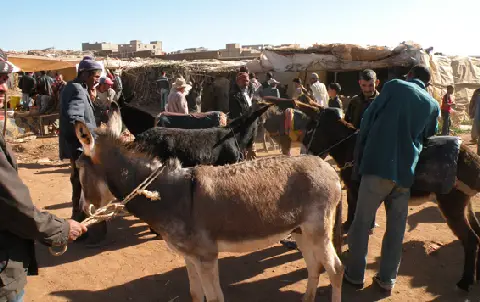Morocco: Give Me the Simple Life
Story and photos by Jim Johnston
Visiting his Peace Corps volunteer mother in a Moroccan Village, Jim Johnston finds her ascetic lifestyle in a drab village challenges his assumptions about what is necessary for a comfortable life.

When the taxi dropped us off in the Jemma el Fna, the wide open central plaza of Marrakesh, the sounds and the smells, the robes and veils and fez caps, the donkeys and the horse carts all immediately announced a new country. My partner Nick and I had been traveling in Southeast Asia for a month, with quick stops in London, Paris and Milan. Our heads were spinning from an overabundance of cultural input, exotic foods, strange hotels, and too many airplane flights—but we were ready for more.
We'd come to Morocco to visit my mother, Muriel Johnston, who at age 85 is currently the world's oldest active volunteer in the Peace Corps. Her assignment is in a small town, where she works with local school children in basic health care programs. She'd been there for a little over six months and we were her first visitors from home.
By chance, she was just finishing a week of training with her Peace Corps group in Marrakesh the day we arrived, so we had the opportunity to meet some of the other volunteers, most of them well under 30. Clearly mom was popular with the younger crowd, but she was also aware of the difference in ages. "They all get together sometimes, but who wants an 85–year old at their party?", she said without self–pity. But I was relieved to see that she'd been given the biggest, most comfortable bed in the dorm where the volunteers were staying. "I didn't really want it, but the others insisted," she chuckled.

We spent five days as tourists together in Marrakesh, exploring back alleys, eating in hole–in–the–wall soup stalls, and fighting off carpet salesmen. Mom would use a few words of Tashilheet (the Berber dialect spoken in her town) while chatting with people we met. The reaction of curiosity and happy surprise was one that started to feel familiar.
Our plan was to return to my mother's town and spend a few days there. It's two hours from Marrakesh and she wanted to take the bus, but we convinced her that we could afford the rental car. "It's really not necessary," she said. I could feel my Western–trained need for comfort and control taking over.
Concrete, not Kasbah
Home to a few thousand people, Tannant is a simple farming community, where life goes on much as it has for centuries. Visually, it's a new–ish town, without the charming mud–walled farmhouses that appear all over Morocco. Most of the construction is of unpainted concrete, imposing a dull gray monotony over the background of red earth tones. The main road runs down the center of town—you could drive through the place in about 90 seconds. There's a row of arcaded shops on one side of the town's center, a café where the men hang out, a shack where fruits and vegetables are sold, a pharmacy, a new, very clean hammam (public steam bath), and a basement space where you can connect to the Internet.
As city dwellers, we thought of it as "simple," although according to other Peace Corps volunteers, this was a cushy assignment—running water, electricity and Internet still don't reach a lot places in Morocco. "Don't you get bored here?" Nick wondered. "I was bored in Florida," my mother answered, "It's all too new here for me to ever be bored."
The town really comes to life on Wednesdays, when the weekly souk takes place. We'd walked by the market area the day before and saw a desolate field of wind–blown dirt with some stick–built shacks defining its edges. Surrounding cacti had snagged hundreds of plastic bags and garbage was strewn around the edges of the field. Broad, purple–gray mountains defined a cool distant background to the scrubby dry land.
On Wednesday morning we trudged over the hill to the market, passing by the "parking lot," where donkeys were tethered to the ground, patiently waiting in the sun until late afternoon when things shut down and their owners would return.

Sticking Out on Market Day
The market spread out like scene from a Biblical epic. Men in striped woolen robes lead donkeys by frayed ropes along the packed dirt aisles, which were piled high with local fruits and vegetables, gleaming in their dusty setting. My mother, Nick, and I made a curious trio in this land of mostly Berber men, hunched at ground level, shopping for meat and produce, haggling over mules and live chickens, or sipping mint tea in humble straw–roofed sheds.
I was aware of a wisp of my mother's white hair sticking out from her head scarf. "All women wear head scarves here, but not veils. It's actually considered a fairly liberal town," Mom explained. We were mostly ignored as we walked through the market, but I felt keenly aware of my camera, apparently the only one in the market. It felt heavy, expensive, and showy.
We bought some vegetables, freshly baked bread filled with spicy fish, and a hand carved wooden stool, but we were unsuccessful in our search for a corkscrew to open the bottle of wine we'd bought at the Milan duty–free shop. As we'd imagined, corkscrews are not easy to find in a Muslim market (Nick eventually managed to push the cork in with a screwdriver).
Some school children passing along the way called out "Bonjour, Muriel!" (Everyone here gives her name its French pronunciation Mu–ree–ELLE), and a local truck driver greeted her like an old friend. As the only non–Moroccan in town, my mother seemed to have taken on the role of minor celebrity.
A Simple Life in Morocco
Mom's apartment is on the second floor of a concrete house down a dusty path on the edge of town. The four rooms were newly painted yellow, a few calendar photos and artwork from her great–granddaughters adorn the walls. Outside on the roof, amidst leftover building materials, are the neighbor's satellite dishes and laundry lines. When it rains, the slope of the roof sends water rushing under the front door. Looking over the wall you can see rows of ancient, gnarled olive trees, and lots of garbage thoughtlessly tossed about.

The bed, two small tables and two chairs had been ordered from the local carpenter, a mattress and minimal kitchen supplies were found in the weekly market. The only appliance in the kitchen is a two–burner gas stove. There's no refrigerator, but she's learned that wrapping things with a damp towel will keep them fresh for a few days. All organic kitchen waste is used for compost around the olive trees out front, and all burnable garbage is kept for the neighbors to heat water for their family hammam. The apartment's only sink is in the kitchen; it drains into the bathroom next to it. The bathroom has a squat toilet with a cold water  spigot, and a window that affords serene views of distant blue mountains. She bathes with a bucket of water warmed up on the stove, or goes to the local hamman if it's too cold.
spigot, and a window that affords serene views of distant blue mountains. She bathes with a bucket of water warmed up on the stove, or goes to the local hamman if it's too cold.
Mom has never been much attached to luxury, but even her trailer back in Florida seemed sumptuous compared to her new home in Morocco. When I got back to our apartment in Mexico City, it seemed like a palace with its flat–screen TV and DVD player, closets filled with clothes and shoes, a kitchen equipped with a food processor, rice cooker, and fancy corkscrew. I had felt sorry for my mother in her humble surroundings, but when I looked at the photos of her when I got home, I saw a smile on her face unlike any I'd seen.
The best journeys have left me with more questions than answers. Since returning from Morocco, I keep wondering, How much is enough? My mother, the accidental Buddhist, seems to have found an answer.
Jim Johnston, artist and writer, is author of Mexico City: an Opinionated Guide for the Curious Traveler. He lives in Mexico City. He blogs at www.mexicocitydf.blogspot.com and www.liveonarrival.blogspot.com
Related articles:
On a Slow Boat down the Irrawaddy River by Jim Johnston
Extreme Eating in Morocco by Amy Rosen
The Penitent Legionnaire by Robert Ward
Other Africa travel stories from the archives
Copyright (C) Perceptive Travel 2010. All rights reserved.
- Eating a Personal Pig by Zora O'Neill
- Mardi Gras on New England's Left Coast by Bruce Northam
- Travel Book Reviews
- World Music Reviews
Books from the Author:

Buy Mexico City: an Opinionated Guide for the Curious Traveler at your local bookstore, or get it online here:
Amazon US
Amazon Canada
Amazon UK

